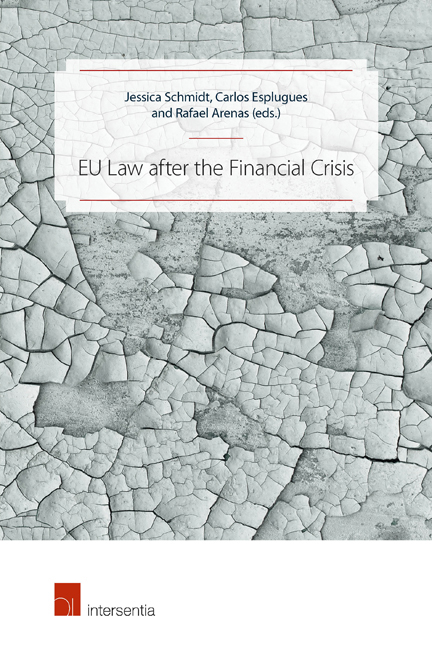Book contents
- Frontmatter
- Contents
- List of Abbreviations
- List of Authors
- Introduction
- PART I RESCUE MECHANISMS AND MONETARY POLICY
- PART II THE IMPACT OF THE FINANCIAL CRISIS ON THE BANKING SECTOR AND CAPITAL MARKETS
- PART III THE FINANCIAL CRISIS AND TAX LAW
- PART IV THE FINANCIAL CRISIS, CONSUMERS AND CONSUMER LAW
- Is European Private Law Going Through a Crisis? The Current Situation of European Private Law after the Financial Crisis
- Financial Crisis and General Contract Law
- Stress-Testing EU Law in the Field of Consumer Redress
- Stress Testing of European Law of Consumer Jurisdiction. Coherence of the Existing Rules and their Impact on the Level of Consumer Protection
- PART V THE FINANCIAL CRISIS AND COMPETITION LAW
- PART VI THE FINANCIAL CRISIS, RESTRUCTURING AND INSOLVENCY LAW
- PART VII THE SOCIAL DIMENSION OF THE FINANCIAL CRISIS AND EU CITIZENSHIP
- PART VIII REFLECTIONS ON THE IMPACT OF THE FINANCIAL CRISIS ON THE GENERAL EUROPEAN LEGAL FRAMEWORK AND THE FUNDAMENTAL “EUROPEAN IDEA”
Stress Testing of European Law of Consumer Jurisdiction. Coherence of the Existing Rules and their Impact on the Level of Consumer Protection
from PART IV - THE FINANCIAL CRISIS, CONSUMERS AND CONSUMER LAW
Published online by Cambridge University Press: 13 December 2017
- Frontmatter
- Contents
- List of Abbreviations
- List of Authors
- Introduction
- PART I RESCUE MECHANISMS AND MONETARY POLICY
- PART II THE IMPACT OF THE FINANCIAL CRISIS ON THE BANKING SECTOR AND CAPITAL MARKETS
- PART III THE FINANCIAL CRISIS AND TAX LAW
- PART IV THE FINANCIAL CRISIS, CONSUMERS AND CONSUMER LAW
- Is European Private Law Going Through a Crisis? The Current Situation of European Private Law after the Financial Crisis
- Financial Crisis and General Contract Law
- Stress-Testing EU Law in the Field of Consumer Redress
- Stress Testing of European Law of Consumer Jurisdiction. Coherence of the Existing Rules and their Impact on the Level of Consumer Protection
- PART V THE FINANCIAL CRISIS AND COMPETITION LAW
- PART VI THE FINANCIAL CRISIS, RESTRUCTURING AND INSOLVENCY LAW
- PART VII THE SOCIAL DIMENSION OF THE FINANCIAL CRISIS AND EU CITIZENSHIP
- PART VIII REFLECTIONS ON THE IMPACT OF THE FINANCIAL CRISIS ON THE GENERAL EUROPEAN LEGAL FRAMEWORK AND THE FUNDAMENTAL “EUROPEAN IDEA”
Summary
INTRODUCTION
A high level of consumer protection as required by Article 38 of the Charter of Fundamental Rights of the EU as well as by Article 114(3) of the Treaty on the Functioning of the European Union (TFEU) cannot only be achieved by rules of substantive law, but also requires adequate procedural mechanisms to enforce the law. Not all Member States provide such effective procedural standards yet. Notable reasons for this lack of effectiveness include the excessive duration of civil proceedings and high procedural costs in relation to rather small values of the claims in question.
In order to enhance the enforcement of consumer rights, the European institutions focus predominantly on the implementation of alternative dispute resolution measures such as collective enforcement mechanisms. For example, the European Commission has adopted Recommendation 2013/396/EU of 11 June 2013 on “common principles for injunctive and compensatory collective redress mechanisms in the Member States concerning violations of rights granted under Union law” and the Directive for Alternative Dispute Resolution (ADR Directive). However, comparable efforts to strengthen the effectiveness of individual redress mechanisms have not been made.
The procedural autonomy of the Member States can only partially explain this passivity on the part of the European institutions. In particular, the European Union has quite far-reaching competence to regulate international jurisdiction in consumer law matters (see Article 81(1) and (2)(a) and (c) TFEU). However, the EU did not use this competence to its full extent. The Brussels I bis Regulation provides only for a limited set of rules regarding consumer jurisdiction. Notably, Articles 17–19 of the Brussels I bis Regulation only cover contract matters, and only apply provided that certain further conditions are met. This is all the more remarkable as the effectiveness of enforcement of consumer rights relates strongly to the jurisdictional rules. It is obvious that the willingness, practical possibility and financial capacity to enforce one's rights depend on whether the legal proceedings take place in close proximity to the consumer's residence. In international cases, language barriers and barriers resulting from the application of foreign national law may be further impediments to consumers enforcing their rights by means of legal proceedings.
- Type
- Chapter
- Information
- EU Law after the Financial Crisis , pp. 147 - 160Publisher: IntersentiaPrint publication year: 2016



